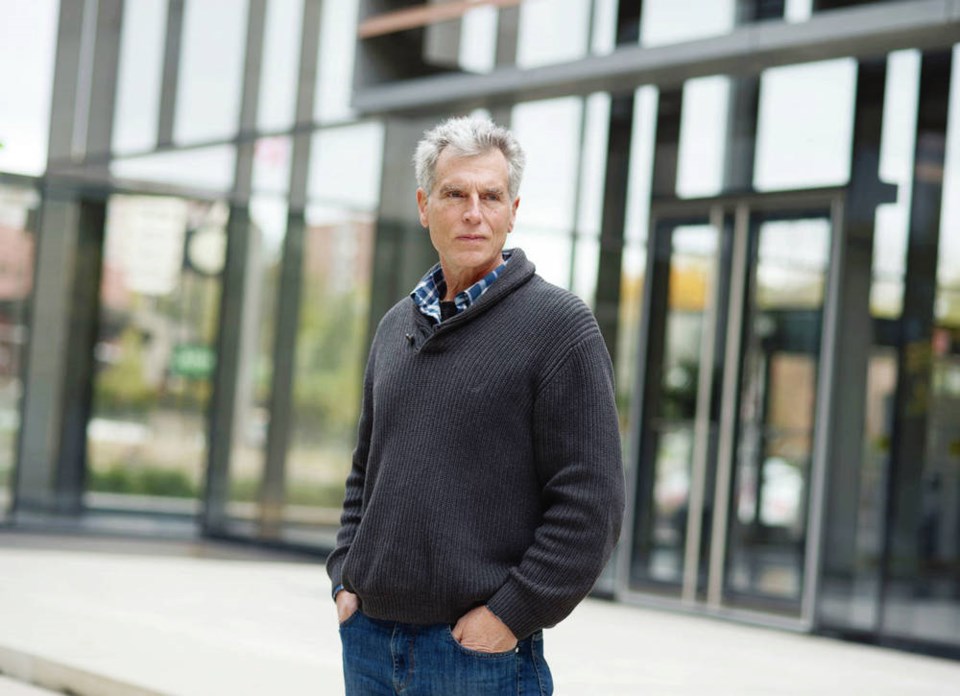As wildfire smoke blankets B.C., a visible reminder of the climate emergency amid a global pandemic that has laid bare societal inequalities, the dystopian future predicted in science-fiction novels might seem close to reality.
But Thomas Homer-Dixon, an author and complexity scientist at Royal Roads University — who has earned the moniker the “doom-meister” for his stark warnings that climate change-caused environmental devastation is on our doorstep — argues the key to tackling these overlapping crises is hope and co-operation.
Homer-Dixon, who in September released the book Commanding Hope: The Power We Have to Renew a World in Peril, said the simultaneous arrival of the global pandemic, the ongoing climate crisis and a reckoning over systemic racism and inequality is no coincidence.
“They’re happening simultaneously because they’re related to each other,” said Homer-Dixon, director of Royal Roads’ Cascade Institute, which studies the intersections between the world’s biggest problems, including climate change, wealth inequality, pandemics and political instability. Homer-Dixon will speak Wednesday as part of Royal Roads University’s changemaker series, which will take place online.
“We’re getting these very vivid signals that things are going off the rails, and people have been warning about it for a long time, but now it’s visible in a way that it’s really hard for members of the general public to ignore.”
Before the pandemic hit, it was the election of U.S. President Donald Trump in November 2016 that convinced Homer-Dixon that even in an increasingly divisive world, the message of hope had to be central to his book.
“If we lose hope, especially if our children lose hope, then all really is lost,” said Homer-Dixon, who is also the research chair in the Faculty of Environment at the University of Calgary.
Homer-Dixon said he spent eight years researching and writing the book, but in March, as COVID-19 spread across the world, he went through every line, inserting references to the global pandemic, the likelihood of which was already mentioned in early versions of the book.
Homer-Dixon said most people expect changes to occur gradually, but the pandemic serves as a global lesson in what a big system shift looks like and how policy makers can react to it.
“Within a few weeks, we had four billion people locked down around the planet. There’s never been an event like that in the history of human species, where a social behaviour has changed so dramatically for such a large proportion of the species so quickly.”
The speed with which governments around the world instituted pandemic safety measures should be replicated with climate action, Homer-Dixon said, and the thick smoke from wildfires should shake us from complacency.
“We’ve had a warming of just over one degree Celsius on the planet and we’ve had a dramatic increase in wildfire rates all over the planet.” At the rate of current global emissions, the world is on track to warm by three degrees over pre-industrial levels, at which point “there won’t be an ecosystem on the planet that’s not wrecked,” Homer-Dixon said.
The pandemic has taken place amid a backdrop of global anti-Black-racism protests and has laid bare the reality that COVID-19 disproportionately affects people of colour. This forces people to realize how much we depend on lower-wage workers such as migrant farm workers or front-line service workers, Homer-Dixon said.
“We are not only dependent on these folks, but if they aren’t helped, and if they aren’t prosperous parts of our community, then we are going to suffer,” he said. “These problems are systemic in that they spill across all boundaries.”
Homer-Dixon acknowledged that, while mask wearing has become political and tensions have flared over drivers with non-B.C. plates, polling data shows that in most countries outside the United States, the pandemic has actually increased cohesion within communities.
“I think one of the things the pandemic has communicated globally is we have an incredibly pressing situation of shared fate. We’re all together in this boat.”
The contest now, he said, is between “folks who think they’re going to do better by fighting each other, by retreating into their individual camps … and those who think: ‘Well, I guess we’re going to have to co-operate and solve these problems together.
“It’s not clear which way we’re going to go.”
Thomas Homer-Dixon’s speech will be broadcast live from the Royal Roads Facebook page Wednesday at 4 p.m. More information at www.royalroads.ca/event/changemakers-speakers-series



